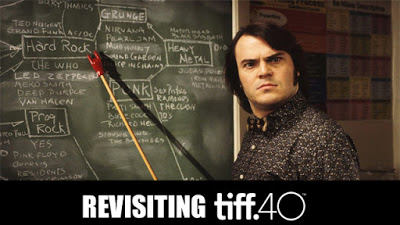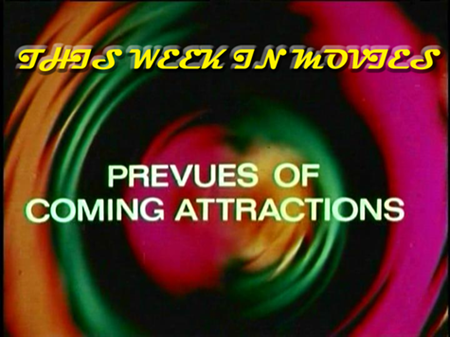Revisiting TIFF 2003: School of Rock

In celebration of the 40th anniversary of TIFF, I will be revisiting one film from each year I attended the festival. Please be aware that these discussions may include SPOILERS.
The Toronto International Film Festival is an event that I was well aware of growing up. I would either see festival coverage on the TV or read about the films in the newspaper. While, it’s a little more lenient today, the festival used to have a strict 18 and over attendance policy, which delayed the time that I could have attended the festival myself.
Theoretically, I could have started attending TIFF during the 2000 festival, which is the year that I turned 18. However, I found such a task to be difficult around school, so I wouldn’t attend TIFF until after I graduated from Humber College (where I took Computer Programming) in 2003. Back in 2003, single tickets for the festival cost $14.50. While much less expensive than they are now, it was still a bit much for my non-existent income. As such, I had to limit myself to one or two films.
While Richard Linklater’s School of Rock, which was one of 2003’s Gala screenings, was a film that I undoubtedly wanted to see, it wasn’t my first choice to see at the festival. School of Rock was a very mainstream selection and it was scheduled to open wide just a month after the festival, so I actually wanted to see a film that I might not have seen otherwise.
In reading up about the festival beforehand, a number of the selections caught my eye. These included Alejandro González Iñárritu’s 21 Grams, Jim Jarmusch’s Coffee and Cigarettes, and Billy Ray’s Shattered Glass. However, I was quite naive to how popular a festival TIFF was and I ended up waiting until the festival’s opening weekend to go and buy tickets. All three of those films were off-sale and it left me in a panic. With me not knowing what any other the other films were about, I was left choosing an available screening for a film that I was familiar with. That of course was School of Rock.
In hindsight, this was a fitting choice for my first ever TIFF screening, if not for the film, than for the venue. Back in 2003, TIFF still had the majority of its venues in and around Yorkville. Probably the most beloved of these venues was the Uptown theatre near Bloor and Yonge. I had walked past this theatre countless times as a teenager, but I never got around to actually seeing a film at the Uptown. Well, when I went to go see School of Rock at a 10:00 AM repeat screening in the middle of the festival, the Uptown was mere days away from closing down for good. As such, I am quite glad that I got to see one screening at the theatre before it closed.
Alright, now it’s time to move onto the film itself. In hindsight, it’s quite amazing that a typically indie director like Richard Linklater would have directed a fairly mainstream comedy like School of Rock. Of course, Linklater first gained prominence with 1993’s Dazed and Confused, so School of Rock wasn’t too much of a stretch for him. However, it is interesting to think back now and realize the Linklater had just started making Boyhood when School of Rock was being made, which demonstrates how he can do two very different films at once.
School of Rock is a film that was tailor made for Jack Black. Up until this point, Black was known primarily as a supporting actor. His first major lead role was in the Farrelly Brothers’ Shallow Hal in 2001, which didn’t exactly set the world on fire. In addition to his acting, Jack Black was known as a member of the comedic rock duo Tenacious D, with his stage persona of JB being quite similar to his character of Dewey Finn in School of Rock.
School of Rock was written by actor and screenwriter Mike White, who had previously collaborated with Jack Black on the 2002 teen comedy Orange County. The role of Dewey Finn was written specifically for Jack Black, who has a real love for all the classic rock songs that are featured within the film.
Even though School of Rock is now a 12 year old film, it has aged remarkably well. Since the film’s soundtrack is primarily made up of songs from the 1970s or 1980s, it ends up giving the story a real timeless feel to it. Without a doubt School of Rock can be seen has Jack Black’s signature role and it is much better than Tenacious D: The Pick of Destiny, which came out a few years later. Jack Black reteamed with Richard Linklater for Bernie in 2011, which brought out another great performance.
It is interesting to go and see what happened to the many child actors in the film. Some of them such as Miranda Cosgrove (band manager Summer) are still acting, while others like Joey Gaydos Jr. (guitarist Zack) haven’t appeared in other films since. The way these children play off with Jack Black really makes or breaks the film, so it’s a good thing that the film was well cast in that regard.
At the start of this column, I made mention how School of Rock was one of the most mainstream films in Richard Linklater’s filmography. However, I really do feel that his involvement really helped to make the film as something more that simply a musical-comedy. As members of a rock band, many of these kids learn self-esteem and the film really demonstrates that the arts are just as important an educational tool as math or science. I considered School of Rock to be one of my favourite comedies back in 2003 and I still very much like the film.



